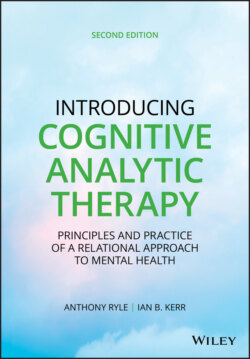Читать книгу Introducing Cognitive Analytic Therapy - Anthony Ryle - Страница 21
CAT Evolved from the Needs of Working in the Public Sector and Remains Ideally Suited To It
ОглавлениеDespite the proliferation of treatment models, a considerable proportion of psychologically distressed and damaged people in the UK (and in most other “developed” countries, let alone in the “developing” world) do not have access to effective psychological treatment. It should, however, be noted that Western models of mental disorders and treatment, of whatever kind, are certainly not applicable without considerable re‐conceptualization in different socio‐cultural contexts worldwide. In many socio‐cultural settings, psychological distress or disorder will be conceived of and responded to quite differently, or indeed not in “psychological” terms at all. However, the concept of the socially constituted Self underpinning CAT, and its collaborative approach to meaning‐making, may enable the model to be used flexibly and helpfully in these other contexts (see Chapter 9). Emerging experience with CAT around the world has certainly been encouraging (see Chapter 9). Meantime CAT, by providing a therapy that can be offered at reasonable cost, while being effective across a wide spectrum of “diagnoses” and a wide range of severity, is making a contribution to meeting the needs of many patients in many, although significantly not all, Western countries.
Most CAT therapists in the UK and elsewhere have worked in the NHS, or public health services, as nurses, occupational therapists, social workers, psychologists, or psychiatrists. We are, for the most part, experienced in, and largely committed to, work in the public sector. We share a social perspective which assumes that psychotherapy services should take responsibility for those in need in the populations we serve, and should not be reserved for those individuals who happen to find (or buy) their way to the consulting room. It does, however, appear, not surprisingly perhaps, that CAT is becoming a popular model of therapy in the independent sector where, in some countries more than others, many therapists make their living, and may offer an important provision of treatment. Here, its time‐limited but radical “whole‐person” approach appeals to many clients who may have, possibly serious, psychological difficulties. As a model of brief therapy it is of course, for very different reasons, attractive to health insurance companies.
Our own social perspective and sense of commitment is not new. The following description of the NHS was sent to demobilized servicemen in 1950: “It will provide you with all medical, dental and nursing care. Everyone, rich, poor, man, woman or child, can use it or any part of it. There are no charges except for a few special items … But it is not a charity. You are all paying for it, mainly as taxpayers and it will relieve your money worries in times of illness” (quoted in Wedderburn, 1996.) Despite the chronic underfunding of mental health services and of psychotherapy in particular, both in the UK and elsewhere, we believe that these principles can still be fought for and that CAT can contribute to their realization.
